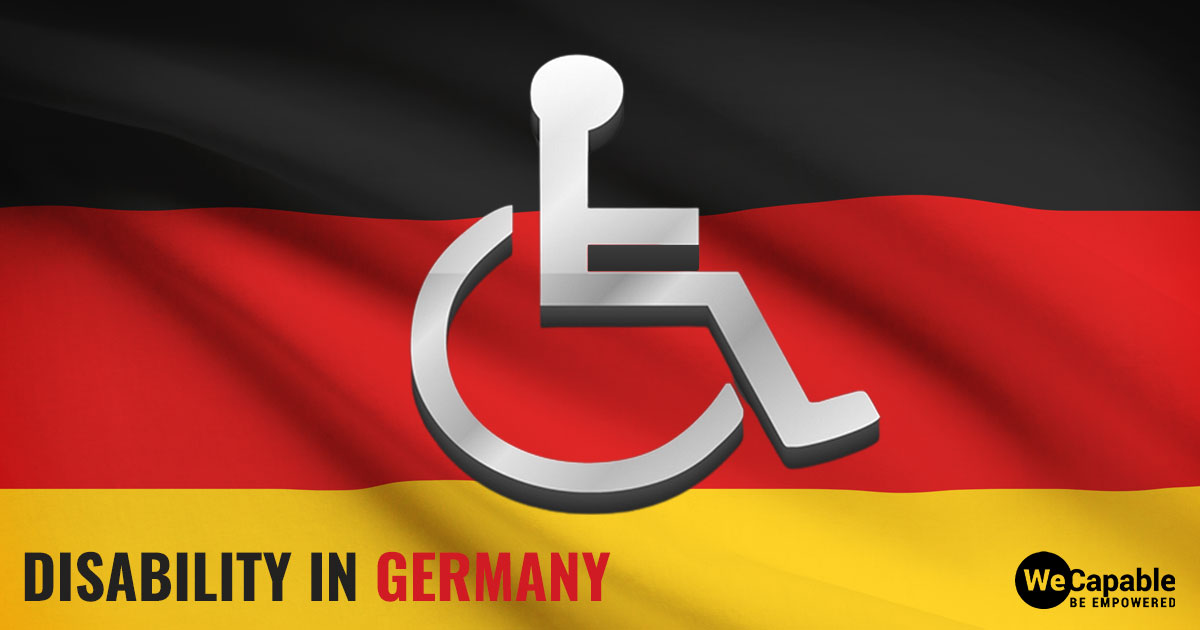Today Germany might be among the top 20 most peaceful countries according to the Global Peace Index 2021 but the days of Nazi Germany are yet not forgotten. It is estimated that around 2,50,000 individuals with disabilities were brutally murdered by the Nazis between 1939 to 1941. The only mistake of those individuals was that they were inflicted or supposed to be inflicted with physical or mental disability. Nazis believed that people with disabilities were ‘life unworthy of life’ and so they killed them to free the society from their burden.
How much has the social perspective changed towards persons with disabilities in the German society? Let us try to evaluate it through the existing laws, their implementation and people’s attitude towards individuals with disabilities in the country.
Definition of Disability in Germany
Disability is defined in Germany by the Germany Social Code. It defines disability as a non-temporary diminishing of bodily or psychological abilities that is due to an irregular state, rather than induced by age or temporary illness.
Individuals may be considered as disabled in Germany “if their physical functions, mental capacities, or psychological health are highly likely to deviate for more than six months from the condition which is typical for the respective age and whose participation in the life of society is therefore restricted”.
The severity of disability or degree of impairment in Germany is determined according to a list of impairment and diseases. Autism, for example, is automatically considered 30% disability. It is also determined according to the guideline prepared by a group of medical and legal experts. These guidelines differ at regional levels.
A disability level over 50% is classified as ‘severe disability’. A disabled person between 30-50% may be considered severely disabled by a decision of the competent authority. If they are not considered severely disabled by the authorities they may not obtain or keep a suitable job for their condition.
Laws and Legislation Regarding Disability in Germany
1. Germany Social Code
This law has been designed to ensure social welfare, justice and equality. As stated above, this is the law that defines disability in Germany. The law is divided into twelve books – SGB IX specifically deals with Rehabilitation and Participation of Disabled Peoples. It is the legal basis of rehabilitation since 2001 in the country. It basically deals with rules for compensation of work-related accidents and disabilities caused due to war. According to the social code of Germany Unequal or discriminatory treatment of disabled people due to the cause of their disability is ‘accepted less’.
2. General Equal Treatment Act 2006
This law protects people with disabilities from discrimination at the workplace. Federal ‘Integration Offices’ have been set up in each state as a resource to disabled employees as well as their employer. No employer is allowed to terminate a qualifying disabled individual without prior consent from the integration office. The local integration office verifies the disability and assesses the assistance that might be needed by the person to continue the job. If it is found that continuing employment is not possible or acceptable for the disabled employee then the employer will get the consent of dismissal for the disabled employee.

Employees with qualifying disabilities are provided allowances or tax deductions to acquire a personal motor vehicle for commuting to the office. They are given refunds if they pool cars for the purpose or they may also get free access to public transport.
Laws Regarding Gainful Employment of Persons with Disabilities in Germany
Businesses employing more than 20 employees in Germany are required to reserve a 5% quota for persons with severe disabilities. Failing to comply with the rule they are obliged to pay a scaled compensatory levy.
Workplaces with five or more disabled staff should have an ombudsperson elected by disabled employees to voice their needs and demands at the workplace. Disabled employees are entitled to additional five days of holiday per year.
Special needs of persons with disabilities should be considered. Employers can get subsidies from the government for this purpose. They can also apply for compensation for providing probationary employment and internship to persons with disabilities.
Persons with disabilities are also protected from any direct or indirect discrimination at their workplace.
Disability Statistics of Germany
At the end of 2019, approximately 7.9 million people with disabilities i.e. 9.5% of the total population of Germany were residing in the country. According to the figures received in the survey, men are more likely to have a disability (50.4%) as compared to women (49.6%).
Social Status of People with Disabilities in Germany
According to a 2015 survey done by the anti-discrimination office, people with disabilities are most likely to face discrimination even at workplaces. Federal Anti-discrimination Agency of Germany reported that more than a third of businesses opt for paying compensation fees over employing persons with disabilities. A separate survey found that around 49% of people with a disability avoid disclosing their disability to their colleagues.
The unemployment rate of severely disabled people in 2018 was 11.2%, almost double the percentage of the general unemployment rate of 6.5%. Only about 35% and 50% of all towns and cities of Germany are said to be wheelchair-accessible or only partially accessible. Only one in five railway stations in Germany are fully accessible.
Overall, Germany has progressed a lot but still, there’s a long way to go for it to become a just and equal society for people with disabilities.
Use the citation below to add this article to your bibliography
"Disability in Germany: Definition, Laws, Employment, Statistics, Social Status." Wecapable.com. Web. July 27, 2024. <https://wecapable.com/disability-in-germany-definition-laws-employment-statistics-social-status/>
Wecapable.com, "Disability in Germany: Definition, Laws, Employment, Statistics, Social Status." Accessed July 27, 2024. https://wecapable.com/disability-in-germany-definition-laws-employment-statistics-social-status/
"Disability in Germany: Definition, Laws, Employment, Statistics, Social Status." (n.d.). Wecapable.com. Retrieved July 27, 2024 from https://wecapable.com/disability-in-germany-definition-laws-employment-statistics-social-status/

Leave a Reply